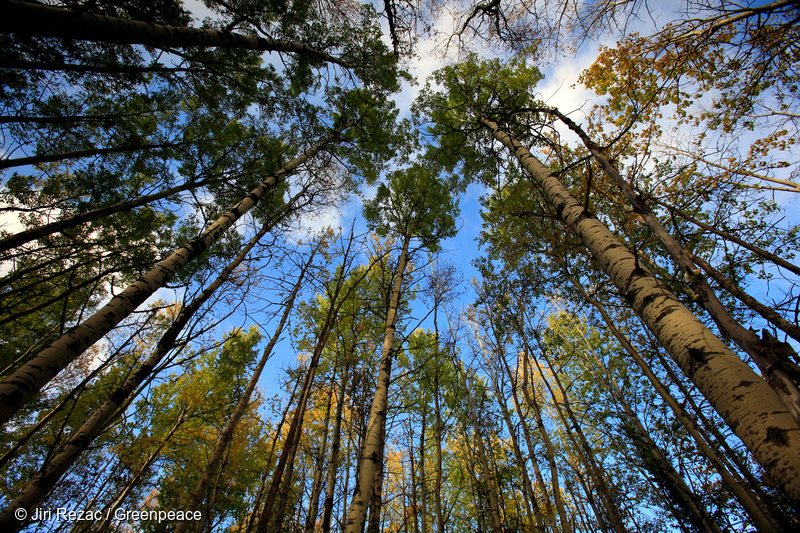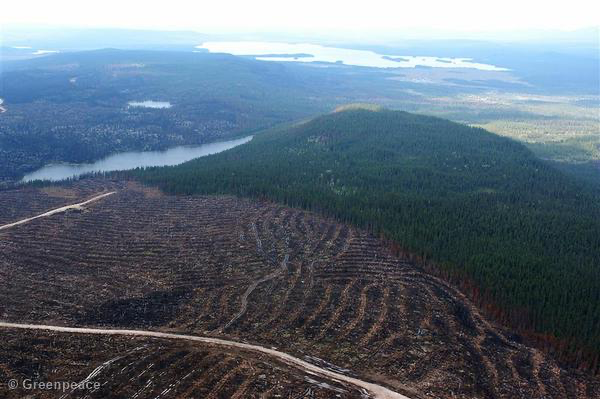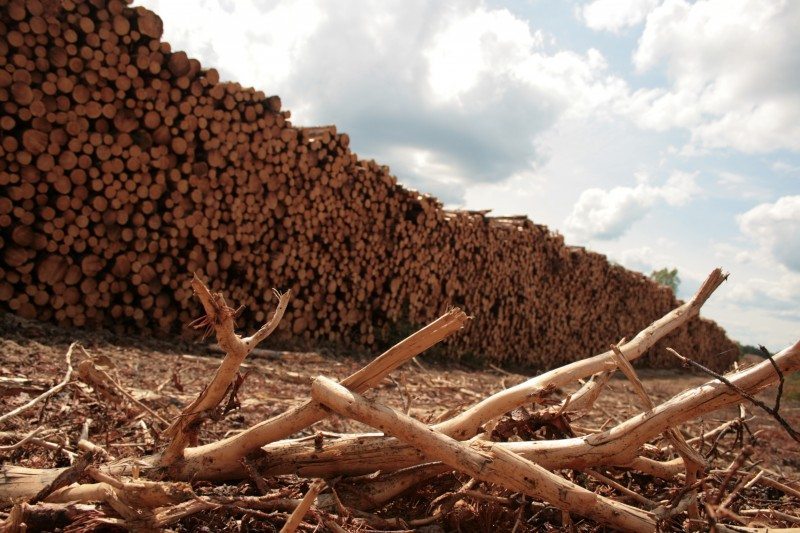Greenpeace is ready to move past conflict with Resolute Forest Products for the health of the Boreal forest.

This article was originally published on August 14, 2015 by Greenpeace Canada.
This month, a multibillion dollar logging company spent a small fortune taking out full page attack ads aimed at Greenpeace and ForestEthics in newspapers across Canada.
If you didn’t see the ads, the company, Resolute Forest Products, attacks our organizations for allegedly “seeking to exclude key stakeholders who have a direct socio-economic interest in the boreal forest.”
This is, of course, completely false.
In fact, just prior to the appearance of these costly ads, Greenpeace Canada explicitly offered to resolve conflicts with the company and stated clearly that any resolution must engage and find support from indigenous First Nations, provincial governments and unions. Resolute rejected this offer as “premature,” wanting instead to prioritize legal proceedings in its $7 million lawsuit against Greenpeace Canada.
Resolute Rejecting Science?
The company also accuses Greenpeace and ForestEthics of a “misinformation campaign.”
To avoid accusations of ideological bias (a common tool of corporate or political elites), virtually all the information we share with the public about Resolute comes from government scientists. In our work in Canada and around the world, Greenpeace has always been science-based. By calling us liars, Resolute is calling Environment Canada’s own scientists liars. And the science tells us that woodland caribou herds in Resolute tenures are at risk. According to Ontario government data, the Brightsand woodland caribou herd overlapping the Resolute-managed Caribou Forest is experiencing excessive disturbance of its habitat. The Temiscamie, Manouane and Pipmuacan herds in and around Resolute operations in Quebec’s Montagnes Blanches are similarly—if not more severely—impacted.
No matter how deep the pockets of Resolute to wallpaper the entire country of Canada with full page ads, the company can’t change the fact that in an era where scientists are warning of a sixth mass extinction of species on earth, the public does not want products sourced from the last habitat of imperiled woodland caribou herds.
This does not mean saying no to forestry. It does mean collaborating to address these worrying trends in Canada’s Boreal forest based on the best available science and traditional knowledge. Some forest companies are already doing this, as are new forest management models like Nawiinginokiima Forest Management Corporation, which recently achieved FSC certification for the Big Pic Forest in Northern Ontario.

Resolute Shoots the Messenger
But Resolute has a history of shooting the messenger. Over the past year, the company has seen the Forest Stewardship Council (FSC) terminate or suspend its responsible forestry certificates, covering an enormous 8.7 million hectares of Canada’s Boreal Forest. Shortcomings in the company’s environmental performance documented by the FSC include impact on woodland caribou habitat and old growth forest, failure to protect high conservation values and lack of support from stakeholders for its operations.
Rather than working to address the concerns, Resolute launched an unprecedented attack on the FSC system, leading to an open letter from FSC International Director General asking Resolute CEO Richard Garneau to stop the “discriminatory activities” and “public attacks.” Resolute also sued its own independent auditor—the Rainforest Alliance—in order to suppress an audit citing Resolute with “non-compliance with FSC standards in the Caribou Forest and Black Spruce-Dog River Matawin Forest and, when publically released, will suspend Resolute’s FSC certificates for those areas.”
Resolute is clearly investing enormous sums in its public attacks at Greenpeace, ForestEthics and other critics, but why not invest this money instead in recovering its FSC certificates, which are crucial for accessing international markets?
Greenpeace has repeatedly communicated to governments, unions, First Nations, customers and Resolute itself our readiness to help the company in this endeavor alongside these very impacted stakeholders.
First Nations Are Decision-Makers
Greenpeace recognizes that indigenous First Nations have the right to free, prior and informed consent (FPIC) for any activities (industrial, conservation or otherwise) that might impact their traditional territories. First Nations governments are decisions-makers in these areas.
This is a core value of Greenpeace and we will not endorse or advocate for anything that does not reflect First Nations rights, aspirations and interests.

A “Sinister Global Agenda” or a Battle for Free Speech?
Peter Foster, writing in the Financial Post some days ago, decried a “sinister global agenda” on the part of environmentalists in advocating a sustainable vision for the Boreal. Bizarre conspiracy theories aside, it is fascinating to see this conflict over sustainability issues in the Boreal also become a fight over free speech and corporate influence.
Resolute is the same company that hired at least six lobbyists in Ontario to weaken or kill free speech legislation in the province.
The same month that Resolute was inking a deal with the Rainforest Alliance that would forever seal a public audit of the company’s operations in the Caribou Forest, the Rainforest Alliance was releasing an audit of unprecedented transparency for Indonesian forest giant Asia Pulp and Paper (APP).
The contrast in approaches to sustainability challenges and collaboration is stark.
So Let’s Get Down to It
Despite Resolute’s latest big money advertising blitz, Greenpeace Canada’s offer to resolve its current conflict with the company remains on the table. It won’t be easy. Hundreds of thousands of supporters across North America (and around the world) have asked us to ensure that future generations can also benefit from a healthy Boreal Forest and the wealth of ecological, social and economic resources it offers.
It’s time to move from conflict to collaboration.


